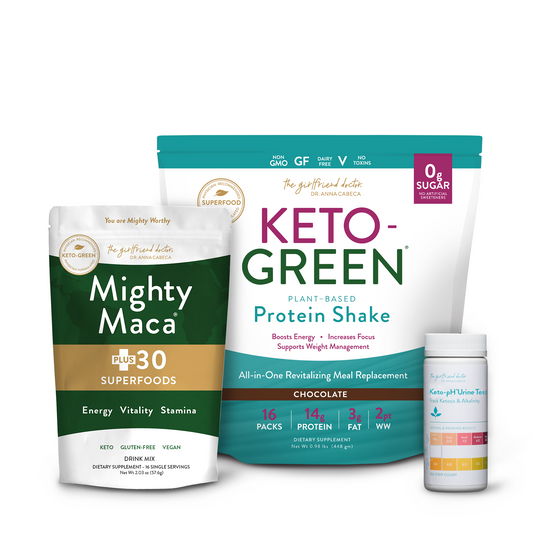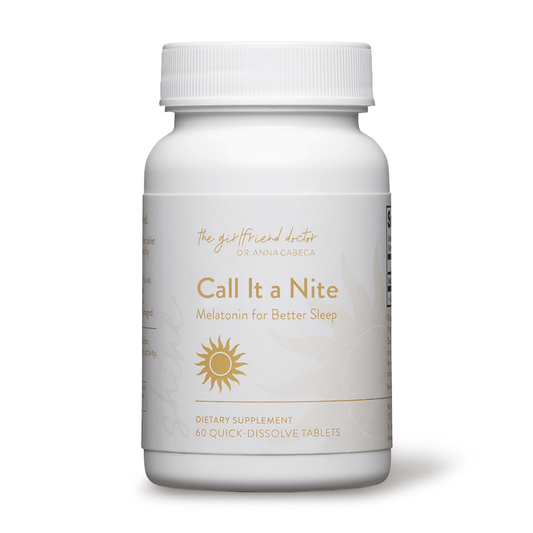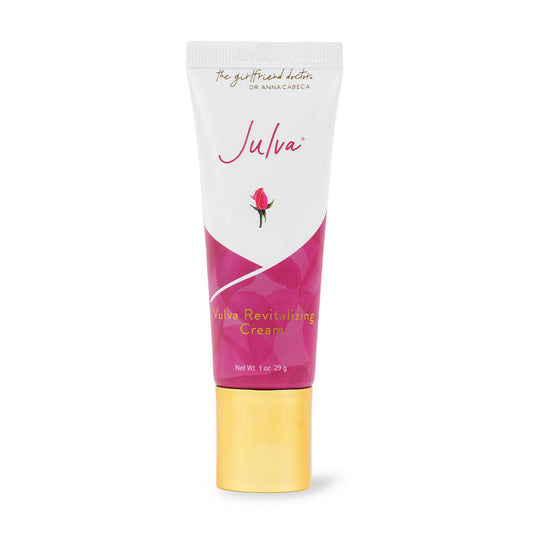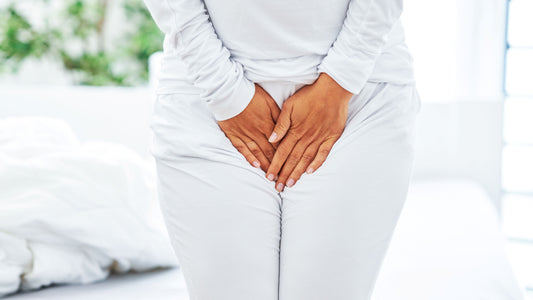It can get quite confusing when you’re looking for a solution for vaginal dryness or discomfort — there are so many products available in the market, these days known as lubricants and moisturizers, how does one even know what is the best and safest choice?
Many of these are advertised as a cure to vaginal dryness but really are only partially effective. Most don’t address related symptoms such as pain during intercourse, vaginal thinning, or urinary leakage. Also, many of these products contain chemicals that can be safety risks or even worsen dryness long term. While helpful for temporary lubrication, these products are primarily cosmetic and provide only short-term relief.
If you’re experiencing vaginal dryness due to perimenopause or menopause, your needs in a lubricant/moisturizer will differ from someone who has dryness due to other reasons (you can read more about vaginal dryness here).

I’ve provided a quick guide that can help you pick the best solution for dryness. Keep in mind a few things when buying lubes and moisturizers.
- First and foremost, you want to make sure the solution is safe for your body. You don’t want to be adding more chemicals into your body (check ingredients. Definitely avoid parabens and aspartame).
- Ideally, you want something that heals the underlying cause of the vaginal dryness as well as addresses other related symptoms such as incontinence, vaginal thinning etc.
- Keep in mind your own personal preference in texture, smell, and taste. Each of us differs, so it might be best to stick to solutions that are more neutral in smell and taste. Adding an essential oil you love is a great option too.
- Choose one that is easy to use so you are encouraged to use it regularly.
Here are a few questions you should ask yourself before purchasing a lubricant or moisturizer:
- What’s its purpose? For long-term healing or short-term relief? Is it for sex or for everyday discomfort?
- Do I also need it to address related symptoms such as pain during intercourse or urinary leakage?
- Will I be using it with other play toys during sexual intercourse?
- Do I have any other symptoms to think about? For instance yeast infections etc.
The Difference Between Lubricants And Moisturizers
Lubricants
They work by reducing the friction that is usually caused by thin, dry genital tissue. Lubricants provide temporary relief to vaginal dryness and are usually applied before intercourse since they are immediate-acting. Lubricants are available in liquid or gel form. Again, I can’t caution enough to look at the ingredients. Vaginal tissue is highly vascular and that means absorbs ingredients well. Many lubes contain petroleum, parabens, and preservatives that all act as endocrine disruptors and can do more damage long term. For a lubricant that is safe, clean, nourishing, and effective, take a peek at my new lubricant, Velvé, just launched recently. It’s aloe and water-based, and designed using my hand-selected blend of beautiful, natural ingredients. It’s especially formulated for menopausal and postmenopausal women.
Moisturizers
Vaginal moisturizers are absorbed into the skin and cling to the vaginal lining the same way natural vaginal secretions do. Like lubricants, they also help to reduce the friction caused by thin, dry genital tissue. Moisturizers are applied regularly and not just before sex. The effects of vaginal moisturizers also last longer than that of lubricants, lasting up to three or four days.
Again, a caution on the ingredients that your choice contains because they can actually make your symptoms worse. For example, you most likely have heard of or used Vagisil which contains toxic ingredients such as parabens, as well as containing benzocaine which can actually cause inflammation in itself. Benzocaine is an anesthetic that does provide relief. The problem, however, is that it can cause inflammation and irritation as seen in a very difficult to diagnose a case of a 27-year-old woman with severe vulvar inflammation and pain published in Contemporary Ob/Gyn. Her doctors were stumped. She underwent biopsy and testing, even treatment with fluconazole for yeast and oral steroids. Nothing was working. Finally, she revealed she was using Vagisil several times daily. Once she stopped, her symptoms completely cleared up!

Types Of Lubricants
Water-based lubricants
Water-based lubricants are considered the safe option to use during intercourse, self-pleasuring or intimate massage since they do not cause latex condoms to deteriorate. (Note that I don’t use the word masturbation because, of interest, its initial meaning stems from the Latin ‘to defile a penis by hand’, therefore my preference). Water-based solutions are more hassle-free since you can easily rinse them off with water, as opposed to oil-based solutions.
There are many OTC commercial offerings available. Read ingredient labels carefully and choose wisely. Search www.ewg.org/skindeep/ to find safe options for you.
Pros: Easy to use. Safe. Easy to wash off. Available OTC.
Con: No long-term relief. Can have unhealthy chemicals and cause irritation.

Ingredients you want to avoid getting near your vajayjay:
– Petroleum-based
– Parabens
– Nonoxynol-9 (kills off good vaginal bacteria)
– Propylene glycol
– Benzocaine
– Chlorhexidine gluconate
*check your ingredients at www.ewg.org/skindeep/
Oil-based lubricants
Oil-based lubricants are products like baby oil, mineral oil, petroleum jelly, hand creams and vegetable oils. While oils might seem like the most common-sense solution to dryness, they can actually work against you. Oil-based lubricants actually cause latex to disintegrate, and should never be used with condoms.
Oil can also leave a coating on the vagina and rectum that might be hard to wash off, increasing your risk of bacterial infections.
Pros: Short-term relief. Available OTC.
Cons: Can increase the risk of bacterial infections when not washed off completely; disintegrates latex, causing latex condoms to break, leading to a higher risk of getting an STD.
Silicone-based lubricants
Think of silicone-based lubricants as a middle ground between water-based and oil-based lubes. It lasts longer than water-based solutions and can be used with latex condoms as well as for intercourse in or around water.
However, the silicone doesn’t usually taste good and can be more difficult to rinse off. Not rinsing off the lube completely has been known to cause vaginal irritation for some women. If you use silicone-based toys during intercourse, you might also want to avoid these lubes as they tend to bond with the toys and cause discomfort.
Pros: Lasts longer than water-based lubes, can be used with latex condoms, can be used in water. Available OTC.
Cons: Texture might feel weird for some, doesn’t taste good, might be difficult to wash off, can’t be used with silicone toys.
Natural lubricant solutions
My preference is always to choose a natural solution first. Organic coconut oil and ghee (purified butter) which can be combined with essential oils or herbal extracts that you like. These are very safe and don't contain the additional chemicals that can be seen in other commercial products.
I've previously shared an article about how to make your own natural lubricant with ingredients from your kitchen, so check out the recipes and try making your own nourishing concoction. Natural solutions come highly recommended because they contain no additional chemicals.
As I’ve mentioned before, our bodies are already going through big hormonal changes, so we want to avoid adding additional chemicals into our system. This is a great way to provide relief while also being safe.
Pros: Short-term relief, safe, no additional chemicals, relatively easy to make at home, smells and tastes great.
Cons: Cannot be used with a condom, requires pure ingredients and takes time and effort.
Vaginal Moisturizers
Vaginal moisturizers present a more long-lasting solution to vaginal dryness, actually working to replenish vaginal moisture and people don't necessarily know that this is a good thing. There are many out in the market, available over-the-counter, but make sure to read the ingredient label carefully as some contain chemicals.
Unlike lubricants, vaginal moisturizers are applied more regularly and can last up to three or four days. Many times vaginal moisturizers and lubricants are used simultaneously — the moisturizer as a daily solution and the lubricant right before sexual intercourse.
Pros: Longer-lasting, works to replenish moisture. Available OTC.
Cons: Might still need lubricant during intercourse.
Estrogen Therapy
One might assume that since vaginal dryness is caused by lowering levels of the estrogen hormone in our bodies, that replenishing estrogen might cure vaginal dryness. Many women continue to have issues even with vaginal estrogen therapy.

If you’re looking to address other symptoms like incontinence issues or pelvic prolapse, or even significant improvements in desire, arousal or sexual satisfaction, unfortunately, an estrogen cream is not the best answer.
Locally-applied estrogen therapy or estrogen vaginal creams improve vaginal moisture and irritation but only addresses the mucosal layer of the vagina — not its deeper layers, the vaginal muscles whereas androgen therapy can have a much better effect. Continued use of vaginal estrogen is necessary for long-term relief.
Vaginal estrogen therapy is not recommended for women with breast cancer. They should look at androgen hormone solutions such as DHEA versus estrogen (more about this topic you can read in my previous blog post).
Pros: Increases vaginal moisture, decreases irritation and pain during intercourse.
Cons: Does not address other issues such as incontinence, does not improve desire or sexual satisfaction, temporary solution, available by prescription only. Caution use in women with breast cancer although research has shown benefits and safety with low dose vaginal estrogen.
Androgen Therapy
Vaginal androgen therapy is available by prescription only. I have prescribed compounded testosterone and DHEA vaginally for over 18 years now and research continues to support safety and efficacy. Androgens improve the muscular layer of the vaginal walls and the glandular secretions which helps the vagina to produce its natural moisture and lubrication not just provide temporary relief.
Next to estrogen, DHEA is a less well-known sex hormone our body produces (other main ones are progesterone and testosterone). DHEA is a hormone produced in the adrenal gland.
Androgens are important to the integrity of skin, muscle, and bone (in both males and females) and have a role in maintaining our libido. They also improve energy levels and mental alertness, provide cardiovascular protection by lowering cholesterol and enhance bone building (by increasing calcium retention).
Unfortunately, all four sex hormones slowly start to decline as we go through menopause. Although most women - and many doctors - focus primarily on decreasing estrogen levels, all four sex hormones slowly start to decline as we age, even prior to our entering menopause.
Locally applied DHEA has been found to play an important role in addressing vaginal atrophy symptoms such as vaginal dryness, incontinence and vaginal thinning.
DHEA
More than a decade ago, I started using bioidentical dehydroepiandrosterone (DHEA) with patients vaginally or applying it topically to the vulvar area with great results. Patients often saw a reduction in irritation and pain during intercourse and experienced improved desire and sexual satisfaction, decreased urinary leakage and most importantly, huge improvements to vaginal dryness.
Locally applied DHEA has been found to favorably affect skin health and appearance due to the production of collagen. It is long-lasting, works on a deep level and actually heals instead of just being cosmetic.
Pros: Research supports that DHEA used locally provides tremendous relief to both vaginal dryness and a number of vaginal atrophy symptoms. Long-lasting effect. Available OTC as a topical cream for the vulva.
Cons: Intrarosa requires a prescription and is only FDA approved for pain during intercourse. Oral DHEA may help with memory, slow cognitive decline; and improve moods, sexual function, bone and muscle mass and heart health. However, oral doses have not been shown to be effective for vaginal dryness or other vaginal atrophy symptoms. Not recommended if currently using Tamoxifen. Do not use if pregnant or breastfeeding. Side effects (typically associated with high dose oral use) can include acne, hair loss, mood changes, facial hair and menstrual changes.
Long-Term Help
For long-term help, I would recommend a combination of DHEA and other quality, natural ingredients that are safe for the body.
I created Julva®, a restorative topical cream for the vulva, for this very reason. It has helped thousands of my patients (as well as myself) experience significant symptom relief and feel good about their sexual health again. My focus when creating Julva was to make sure that it heals long-term, and that it’s safe for the female body (it's also safe for the men who may get it on them!). It had to have anti-aging benefits, had to be easy to use, and had to smell and feel good. The most important thing was that it had to be all-natural, with no additives or toxins.
And that is what Julva is all about, all-natural. Along with DHEA, it contains alpine rose plant stem cells, vitamin E, coconut oil, emu oil and shea butter.
These natural ingredients not only nourish your lady bits to make things feel so much better, but they also keep your vaginal pH and normal bacterial flora healthier, which can help your body fend off yeast infections and other issues.
You can try Julva® for a week, for free. For this 7-day trial pack, you only pay a nominal shipping fee. A great companion product with Julva, which is focused on immediate, short-term relief and pleasure during intercourse and other intimate activities, is Velvé.










